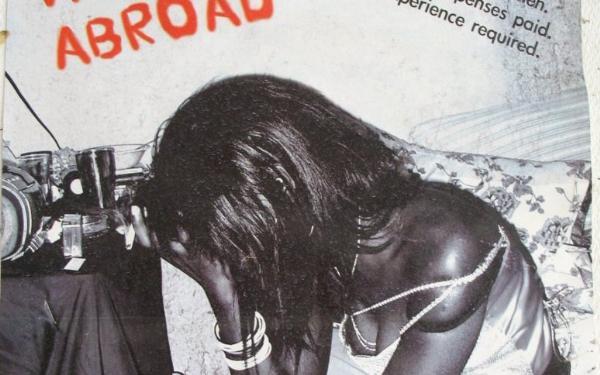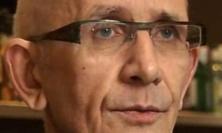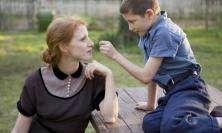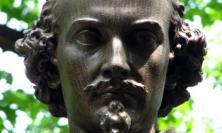The Home Secretary today announced new measures to tackle the prostitution of and demand for trafficked women in this country. Sr Ann Teresa SSJA shares the story of The Medaille Trust’s work with women who are victims of sex-trafficking, highlighting the urgent need to tackle the demand which underlies this form of slavery.
Trafficking for sexual exploitation is the movement of human beings across borders for the purposes of prostitution. It involves the active recruitment and transportation of (mainly) women and children by means of deceit, threat or other forms of coercion. It is always an abuse of power, and it is global in scale.
The United Nations estimates that about two million people are trafficked each year and the figures given for trafficked people at any one time in the UK range between 4,000 – 25,000. Traffickers have targeted every city, town and village in the UK and the police say ‘Wherever we look, we find, even in the most rural of places’. Trafficking is the fastest growing criminal international activity, because it is so lucrative.
Trafficked women, children or young men will have been betrayed by somebody – a family member, an informal contact or a friend. They will be beaten and raped within a short time of leaving home. On arrival at the destination country they will have their personal documents confiscated by the traffickers, and will be forced to have paid sex with many others several times each day. They will be held in severe debt bondage to their ‘owners’ for the expenses incurred in their trafficking. Depressed and traumatised, they often attempt suicide, but will be too afraid to talk to the police because of threats to themselves or to their families.
Up until 2006 the only help available in the UK for the victims of sex-trafficking was that offered by the Poppy Project and funded by the Government. At any one time 25 women would be housed and supported if they agreed to work with the police.
The disparity between the numbers of desperate people needing help and the scant number of safe places available led to the formation, in 2006, of The Medaille Trust. This is a charity founded by Catholic Sisters, Brothers and Priests with the aim of helping women, young men and children who have been freed from sex-trafficking. The Trust runs two Safe Houses and has helped more than 40 women and their babies. It also raises awareness of the issue of trafficking.
This ministry sprang from the experience of working with women in street-based prostitution and from studying prostitution as a global issue. This study led to a growing awareness of sex-trafficking as a major issue of our time.
Demand for prostituted people
There are many under-lying causes of the growth of sex-trafficking. A major one is the constant demand for prostituted people. In the last 10 years, there has been an increase in the numbers of men paying for sex. The internet and globalisation have played a major part in this, as well as package holidays linked with sex tourism. Many men see paying for sexual services as a legitimate form of leisure and entertainment. For these men, the commodification of sex and women provides a context in which, not only is commercial sex normalised, but it is associated with entitlement – with enough money you can buy whoever and whatever you want. As one man said: ‘It’s just like going to Tescos’!
This increasing demand for prostituted people is a major ethical challenge facing us. The Under Secretary of State, Vernon Coaker recently spoke of sex-trafficking as ‘one of the vilest crimes that threaten society.’ He said that all other efforts in counter-trafficking will prove futile if we don’t tackle the demand. Our Government is seriously looking at the Swedish solution, where women in prostitution are seen as victims and those who buy sex are criminalised.
The demand issue is more complex and we need to do more than simply change the Law. We need to change social attitudes and change our perceptions of prostitution as well as challenge the attitudes of many men.
There are a number of people in our society who have begun this debate already, including people in Government, such as Vernon Coaker, Harriet Harman and Jackie Smith. UNANIMA International, which is a group of 16 Congregations of women Religious, has recently produced an excellent resource pack titled ‘Stop the Demand for Trafficking in Women and Children’. These Sisters have taken the issue of demand as their immediate focus for action.
The Counter-Trafficking Movement in the Church
In 2005 two Sisters attended the First Pontifical Conference in Rome, on the Liberation of Women in Prostitution and Trafficked Women. This was a wonderful opportunity to discover what the Church was doing about these issues.
The leaders of the Conference wanted to know:
- What was happening in each country with regard to prostitution and trafficking.
- What the Church was doing about these issues.
They then drew up a pastoral strategy which was sent to bishops all over the world, to help them deal with this new form of slavery.
This Conference inspired the two Sisters to invite Religious throughout the UK to come together in order to explore the possibility of collaborating to help enslaved people in this country. The response to this invitation was such that The Medaille Trust was formed.
In October 2007, the same two Sisters attended a seminar in Rome entitled: Building a Network: The Prophetic Role of Religious in the Fight against Trafficking in Persons. The emphasis was on the Call of God to us, as Religious, to be prophetic in our stance against this slavery. The aim was to strengthen the networks which already exist among Religious Congregations all over the world, in order to fight against trafficking. The Conference led to the formation of ‘The International Network of Religious against Trafficking in Persons’.
Why I, as a Religious, feel called to do this work
I am a Sister of St. Joseph of Annecy and we were founded by Jean Pierre Medaille SJ in 1650, to help the poorest and most marginalised people. I see my ministry with women in street-based prostitution which led to the trafficking work with The Medaille Trust, as responding to the core of my vocation. Trafficked women are treated as ‘non-persons’, and in the UK they are invisible, voiceless and treated as commodities, as things.
All Religious involved in this ministry through The Medaille Trust find it very meaningful. Many of our Congregations were founded to work with the most vulnerable people, and the victims of trafficking certainly fall into this category. A large number of Religious Congregations in the UK support this ministry by providing funding, property or personnel and the experience has been like the ‘Feeding of the 5,000’. Because each Congregation has given what it can, some of the most wretched people in our country are being empowered.
When I first sensed that God was calling me to leave my work with street-based prostitution and to move into the unchartered waters of providing safe housing for trafficked people, I felt overwhelmed. When we interviewed the staff for our first safe house, we gave them three-year contracts, but we only had enough money for one year. At that time, the Medaille Trust wasn’t really functioning and I felt that God was asking me to walk on water – to trust that the money would come at the right time. It did come, and not only the money, but so much more as well because Religious Congregations shared so generously.
Recently, I rediscovered Liberation Theology, in particular the work of Jon Sobrino and Gustavo Gutierrez. For me, this has been like finding the ‘Treasure in the Field’. The work of these theologians resonated with my experience of working with women in street-based prostitution and with trafficked women. My life has been turned upside down and my reading has enabled me to experience God anew; the God who says ‘Set my people free’, Jesus who asks us to walk on water, to trust, to let go.
In particular, I was struck by Jon Sobrino’s statement: “Without the poor, there is no salvation. Without the poor, there is no Church. Without the poor, there is no Gospel”. His understanding of “the poor” was not only the economically poor, but the outcasts of our society and those who are treated as ‘non-persons’. I agree with his statement that conversion means seeing life through the eyes of those at the bottom of the pile, and that God can only be known through the poor.
In the light of Jon Sobrino’s strong statement that “Without the poor, there is no Gospel”, I visited one of our Safe Houses and asked the staff what working with the women was doing for them personally. I am well aware of what we are trying to do for the women, but I had a deep-down conviction that this is a two-way process.
One member of staff said: “I have had my ups and downs in life, but when I am with the women I am constantly reminded of how lucky I am and what a charmed life I have lived by comparison.”
When listening to the Staff, I kept hearing: “I feel privileged to work with the women and to be part of their lives. It is a blessing to be with them”; “I love my job …… I love coming to work”. There aren’t many people who can say this today!
Recently two significant people who run the service for The Medaille Trust shared a meal with the women. They said afterwards, that it was one of the happiest meals they had ever had, and I understood what they meant because of my own experiences of sharing meals with women in street-based prostitution.
Religious Congregations have always sprung up to respond to the great needs of the times, and I see this collaborative ministry of The Medaille Trust, as doing just that. No one Congregation could tackle this global challenge. Every country in the world is caught up in trafficking, as a source country, a transit country or a destination country. We need all the networks that already exist in the Church as well as other supportive networks in order to help our desperate sisters and brothers. I believe that we are simply doing what God asks of us in the Old and New Testament, namely to have a preferential love for the poor, to proclaim liberty to captives, to let the oppressed go free. This ministry is enabling us to see the world through the eyes of the outcasts of our society, of those at the bottom of the heap – which Jon Sobrino calls ‘Conversion’!
Sister Ann Teresa SSJA is the Founder of The Medaille Trust.






